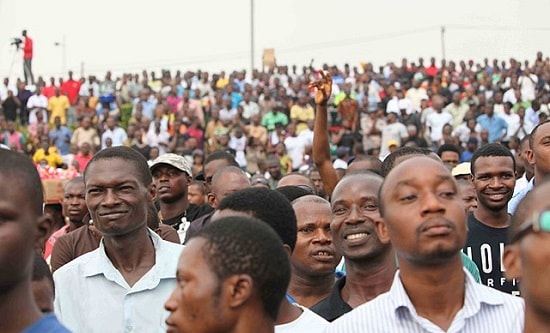
Fight Racism! Fight Imperialism! 225 February/March 2012
After years of pressure from the IMF, on 1 January 2012 the Nigerian government removed a fuel subsidy paid to oil importers, causing fuel prices to rise by 117% overnight, from 65 to 141 naira per litre of petrol. The cost of food and transport nearly doubled. In response thousands of Nigerians took to the streets on 2 January, under the banner of Occupy Nigeria; by day four their numbers had swelled to 100,000. Nigerian trades unions called an indefinite strike starting 9 January. On 16 January the strike was called off after the government decided to keep the subsidy but at a reduced rate, which will still raise the price of petrol by 49%. CHARLES CHINWEIZU reports.
The mass protests are about far more than the subsidy. Protesters want an end to the monumental corruption in the oil sector, and the resignations of President Goodluck Jonathan, Finance Minister Ngozi Okonjo-Iweala, a former World Bank Managing Director, and Petroleum Minister Diezani Allison-Madueke, a former executive director of Royal Dutch Shell.
Over 10 million people, Muslims and Christians, protested across the country and around the world. This solidarity was particularly noticeable in Kano, in the north, where the Christmas Day bombings of churches and government buildings by the Islamic group Boko Haram killed 43 people. Christians protected Muslim protesters at prayer from police attempting to disperse demonstrations and vice versa. It suggests that, despite continuing Boko Haram attacks (on 20 January, an attack on eight government buildings in Kano left at least 170 people dead) and reprisals in the south, where mosques have been bombed and over 10,000 Muslims have fled southern cities, the attempts by elements of the ruling PDP to use Boko Haram to sow religious division have had only limited success so far.
On 5 January, soldiers seized protest sites in Lagos and strategic cities on the pretext of preventing ‘misguided elements unleashing violence’. Earlier soldiers, police and vigilante gangs dispersed demonstrators using beatings, tear gas and live bullets. At least 20 protesters have been killed by police and hundreds arrested.
Poverty and suffering
According to UNESCO, in 2010 92% of Nigeria’s population of 155-159 million lived on less than $2 a day, with 71% on less than $1. Most poverty alleviation programmes, worth billions of naira, are mere direct transfers of cash to politically-selected beneficiaries. 41% of children under five have stunted growth due to acute malnutrition.
15 million Nigerian children perform hazardous work in mines, fisheries and agriculture or work as street vendors, and many girls are forced into commercial sexual exploitation. Many parents cannot afford to educate their children. Unemployment is 50% and youth unemployment at least 71%.
Local authorities have delayed increasing the minimum wage – from which businesses with fewer than 50 employees are anyway exempt – to 18,000 naira (£70) a month. An estimated 80% of Lagos’s 10 million workers are in the informal economy.
With no reliable electricity, most people rely on kerosene for cooking, and petrol to power generators for electricity, and for transport. Any fuel price increase will lead to more unemployment and poverty. Remittances from the US and EU diaspora, worth 4% of GDP, have fallen due to the capitalist crisis. Meanwhile the elites live in stupendous opulence and corruption is rife – for example, Nigeria’s public debt, wiped out in 2005, had mysteriously risen back to $35.3bn in 2010 despite booming oil prices. No wonder Nigerians have had enough.
NLC betrayal
The protests were more widespread and angry in the north, the poorest part of Nigeria, especially in Kano. State-wide curfews and a heavy security presence were imposed. Meanwhile in the south eastern oil-rich state of Bayelsa, the Nigeria Labour Congress (NLC) organised no street protests ‘to prevent hoodlums from causing trouble’. 3,000 people held a pro-government counter-rally in the capital Yenagoa. In oil-rich southern Cross River state, market unions, taxi drivers and owners of petrol stations refused to strike. In south western Ondo state, the NLC pulled out of protests on 12 January over ‘fear that the protest might be hijacked and lead to a breakdown of law and order’, after NLC chairman Bosede Daramola met with ‘concerned’ state officials. Northern NLC leaders called on workers to ignore the NLC national leadership and continue with the strike, to no avail.
The NLC has played a dubious role – calling a strike when it looked like the Occupy protests were gaining steam, then engaging in ‘fruitful’ negotiations with the government and calling a two-day break on Friday 13 January to allow protesters to ‘rest, restock and get re-energised’. NLC President Abdulwaheed Omar had said ‘we will continue with the strike until the government reverts back to 65 naira.’ Yet on 16 January the NLC called off the strike ‘to save lives and in the interest of national survival’.
In the past, the NLC was targeted by Nigeria’s dictators, its leaders arrested, tortured and assassinated. This left the road clear for opportunists to rise to the leadership. Hence, for example, former NLC President Adams Oshiomhole is now Governor of Edo state. Oshiomhole supported the subsidy removal. The NLC represents 4 million workers – out of a workforce estimated at nearly 51 million in 2010.
Oil corporations support corruption
Despite being Africa’s biggest oil producer, Nigeria imports refined petroleum products for domestic use, as only four refineries have been built since oil was discovered in 1956. The refineries were running at 11% capacity in 2009, down from 25% in 2008. Nigeria imports 59m litres of petrol daily while domestic consumption is only 35m litres. The cost of a litre of petrol is actually 40 naira.
The government has argued that the ‘subsidy’ benefited only profiteering oil importers and that part of the money saved could provide ‘safety nets for poor segments of society’ and to invest in infrastructure. But no one seriously believes that the National Assembly has the interests of the poor at heart.




